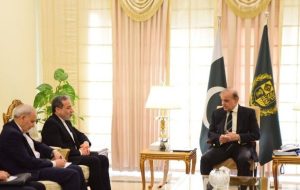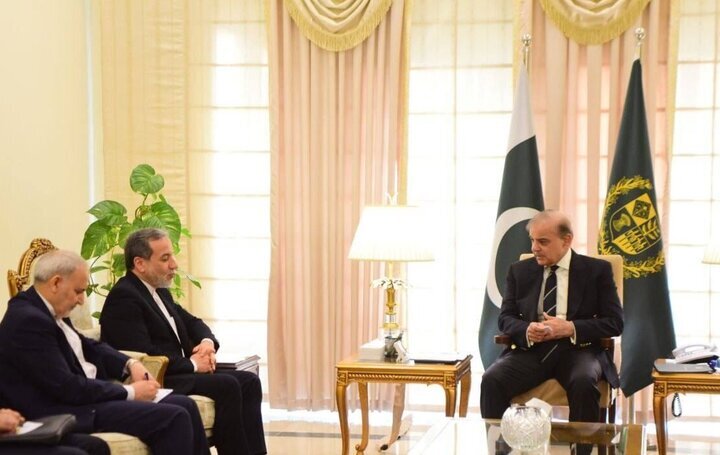Araghchi talks bilateral ties, regional tensions in visit to Pakistan
TEHRAN – During an official visit to Pakistan, Iranian Foreign Minister Abbas Araghchi held talks with Pakistan’s Prime Minister Shehbaz Sharif to address recent developments in their countries’ bilateral relations and discuss critical regional issues. Prime Minister Sharif warmly welcomed Araghchi, highlighting the deep and historic bond between Pakistan and Iran. The leaders emphasized the


TEHRAN – During an official visit to Pakistan, Iranian Foreign Minister Abbas Araghchi held talks with Pakistan’s Prime Minister Shehbaz Sharif to address recent developments in their countries’ bilateral relations and discuss critical regional issues.
Prime Minister Sharif warmly welcomed Araghchi, highlighting the deep and historic bond between Pakistan and Iran. The leaders emphasized the importance of enhancing cooperation and strengthening ties in light of the complex challenges facing the Middle East.
In their discussions, the two officials addressed a broad array of topics, including shared concerns over escalating conflicts in West Asia. Both expressed alarm over ongoing violence in Gaza and Lebanon and the continued hostilities attributed to Israel, stressing the need for coordinated responses to mitigate regional instability.
Araghchi arrived in Pakistan on Monday evening as part of a diplomatic visit aimed at meeting top Pakistani officials.
‘Precise response to Israeli aggression on Iran’s agenda’
Araghchi issued a firm warning to Israel, pledging a “calculated and precise” response to the recent act of aggression that resulted in the deaths of five Iranians in late October.
The foreign minister’s remarks were made during a joint press conference with Pakistan’s Deputy Prime Minister and Foreign Minister, Mohammad Ishaq Dar, aimed at highlighting regional security concerns and strengthening Iran-Pakistan ties.
Araghchi condemned the Israeli attack on October 26, which targeted military sites in Iran and led to the deaths of four Iranian servicemen and one civilian.
“While Iran does not seek to escalate tensions, we reserve our fundamental right to self-defense, as guaranteed by Article 50 of the United Nations Charter,” Araghchi stated. “We will respond to this aggression at the right time and in a calculated and precise way.”
The Iranian foreign minister expressed gratitude to Pakistan for its solidarity, noting the strong condemnation of Israel’s actions by Pakistani leaders, including Prime Minister Shehbaz Sharif. “We deeply thank the government and people of Pakistan for standing firmly with us against this aggression,” Araghchi said.
Turning his attention to the situation in Gaza, Araghchi criticized the global response to the ongoing genocide by Israel against the Palestinian people.
He urged Muslim nations to work collectively to halt Israeli aggression and expressed hope that the upcoming meeting of the Organization of Islamic Cooperation (OIC) would produce meaningful actions to alleviate the suffering of Palestinians and Lebanese, particularly as the region approaches the hardships of winter.
Araghchi praised Pakistan for its longstanding support for Gaza and the Palestinian cause, stressing the need for collective action to end the crisis.
“Despite the efforts of Muslim nations, the international community has failed to prevent Israel’s continued aggression, which not only threatens regional stability but also undermines global security,” he said.
In addition to discussing regional security, Araghchi emphasized Iran’s commitment to strengthening its “brotherly and neighborly” relations with Pakistan.
Highlighting the countries’ shared history, geographic proximity, and cultural ties, Araghchi expressed optimism about expanding cooperation in various sectors, including trade, energy, science, and tourism.
His visit, he noted, comes at the end of a regional tour intended to reinforce diplomatic and economic relations amid heightened geopolitical tensions.
“We aim to deepen cooperation across a broad range of fields with our Pakistani friends and review ways to address regional threats, particularly those posed by the Zionist regime,” Araghchi said, underscoring the necessity of unity against external threats and shared challenges.
In response to the pressing issue of terrorism, both Araghchi and Ishaq Dar stressed the importance of collaborative efforts to counter extremist threats in the region.
“Terrorism is a shared challenge, and Iran and Pakistan are actively working together to combat this menace,” Dar said. He emphasized the need for strengthened security and military cooperation to address terrorism, which has disrupted regional peace and stability.
Araghchi echoed this sentiment, reiterating Iran’s commitment to counter-terrorism partnerships with regional neighbors. “Iran and Pakistan are united in addressing the regional threat of terrorism through multi-level collaboration, including security, military, and political channels,” he said, adding that both countries are determined to maintain their efforts in this area.
Before the press conference, Araghchi held talks with Pakistan’s Chief of Army Staff, General Asim Munir, to discuss Iran-Pakistan defense cooperation and security challenges along their shared border. The Iranian foreign minister is also expected to meet with Pakistan’s Prime Minister as high-ranking delegations from both nations hold discussions on advancing mutual interests.
With tensions mounting across the region, Araghchi’s visit underscores Iran and Pakistan’s commitment to deepening bilateral ties and coordinating responses to shared security threats.
